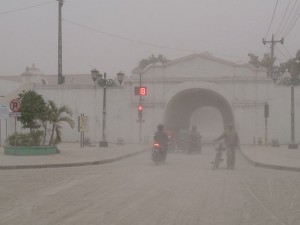World News
Indonesian volcanic eruption brings life and cash as well as death and misery
SIDOMULYO, Indonesia – The ash and debris that Indonesia’s Mount Kelud blasted from its belly brought death and misery, and disrupted international air traffic. But for many of the millions of people cleaning up Saturday in the wake of the explosive eruption, it was also a money earner and a shot of life for their crops.
“This is a blessing of the disaster,” said Imam Choiri, a 55-year-old farmer who was scraping up the ash from the road to use as fertilizer on his small vegetable plot a few kilometres from the crater of the mountain, which was rumbling and smoking in the background. Choiri said locals believe the ash helps drive away pests from crops.
The eruption of the 1,731-meter (5,680-foot) -high mountain on Java island late Thursday was one of the most dramatic to hit Indonesia in recent years, with ash falling as far as 600 kilometres (370 miles) away.
Four people, including a 97-year-old woman, were killed when the roofs of their homes caved in under the weight of ash. More than 100,000 people were evacuated to temporary shelters.
On Saturday, scientists said Kelud’s activities were dying down, in line with its reputation as a mountain that blows its top dramatically but then quickly settles down for another 10 years or so. But authorities warned that water from its crater, along with rain, could bring deadly landslides of fresh ash and rocks down river beds into villages and valleys.
Army troops enforced a ban on people returning to houses within 10 kilometres (6 miles) of the volcano, but many people sneaked back to check on livestock and clean up. Authorities were finding it hard to prevent people from returning, given the money farmers stand to lose by staying away, and said about 56,000 people remained in 89 shelters.
“Our cows need to be milked. If they aren’t, they can get sick and die,” said Marjito, a 45-year-old man who was riding on a motorbike with his wife to his village around 5 kilometres (3 miles) from the crater.
“We have so much work to do, including running and hiding from security officers,” said his wife, Dinayah. Like many Indonesians, both go by a single name.
Six airports on Java – Indonesia’s most densely populated island and home to more than half of the country’s 240 million people – remained closed, including the international hub that serves the country’s second-largest city, Surabaya. Transport officials said this was because of ash on the runway and on planes, not in the atmosphere, and said the airports would likely reopen before Monday.
A massive cleanup was underway in the region, where millions of homes received ash fall. Police and soldiers used water cannons to clear roads that in places were covered in up to 10 centimetres (4 inches) of white ash. Supporters of political parties campaigning for April elections, wearing party colours, also chipped in and gave out food, seeking to win votes on the back of their assistance. Many people were wearing face masks to protect against the dust that remained in the air.
Kelud’s last major eruption was in 1990, when it spewed out searing fumes and lava that killed more than 30 people and injured hundreds. In 1919, a powerful explosion that reportedly could be heard hundreds of kilometres away killed at least 5,160 people.
Indonesia, a sprawling archipelagic nation, is prone to volcanic eruptions and earthquakes because of its location on the Pacific “Ring of Fire” _ a series of fault lines stretching from the Western Hemisphere through Japan and Southeast Asia.
Thirty-eight of the country’s roughly 130 active volcanoes are on Java, forming a spine along the island’s centre. The regular dustings of the land volcanic eruptions bring help ensure soil fertility. Regular rain and sun mean rice, plants, coffee and fruit are easily cultivated.
Volcanic ash and debris are prized in the building industry because they make especially strong cement, and sand diggers can charge almost twice as much per load than they can for regular sand. Scores of diggers were collecting the fresh, easy-to-dig sand Saturday, packing the windfall into bags or onto trucks.
“Kelud is a valuable source of livelihood to me and my family,” Harjito Huda, 30, a traditional sand miner from Ngancar village, said with a smile.






















